What We Teach:
Welcome to Pain Medicine Fellowship based out of the Department of Anesthesiology and Critical Care Medicine at Johns Hopkins Hospital! As a program with continuous ACGME accreditation since 1994, our goal is to continue training future leaders in pain medicine. To that end, we provide one year of multidisciplinary training in pain medicine. Our nationally recognized program offers a wide variety of experience in interventional pain, community and tertiary care clinics, and many opportunities to develop scholarship in research, teaching and patient care.
Our mission is as follows: We train future leaders of pain medicine, providing compassionate patient-and family-centered care, developing skills that progress to independence, advancing discovery and learning of knowledge to improve lives of those with pain.
As part of a multidisciplinary collaboration between the Department of Anesthesiology & Critical Care Medicine and the Department of Physical Medicine and Rehabilitation, a total of six fellows are accepted annually into the intensive interventional pain medicine fellowship program that stresses expertise in the multidisciplinary treatment of pain and the development of independent clinical decision making. In addition to the clinical fellowship year, we are pleased to offer a partnership with the Postdoctoral Research Training Program (T32) for fellows interested in academic research careers.
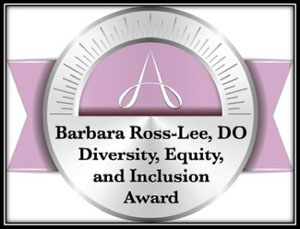
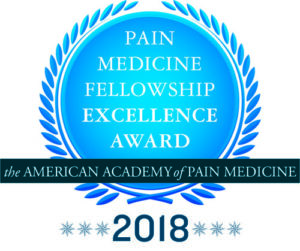
Contact Information
Pain Medicine Fellowship
Department of Anesthesiology and Critical Care Medicine
The Johns Hopkins Medical Institutions
1800 Orleans Street, Phipps 460
Baltimore, Maryland 21287
Phone (410) 955-1818
Fax (410) 502-0541
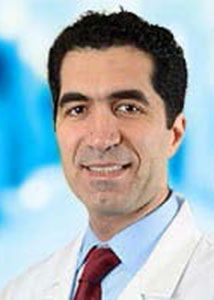
Program Director
Vahid Grami, MD, MPH
Medical Training Coordinator
Beverly Thomas
bthomas6@jhmi.edu
ACGME Accredited: Yes
ABA Certified: Yes
Duration of Program: 1 Year
Positions Available through NRMP Match: 5
Application Deadline: Applications accepted via ERAS from December 1 through March 1st annually.
Basic Qualifications: Completion of an ACGME-accredited residency, most often in Anesthesiology, Physical Medicine and Rehabilitation, Neurology, or Psychiatry. Applicants outside of these specialties are welcome, but all applicants must be able to demonstrate proficiency, or the potential for proficiency, in performing complex interventional pain medicine procedures safely.
All applicants: Please note that successful completion of this ACGME-accredited Fellowship training program does not in itself confer subspecialty certification by your primary specialty's Board. Each individual applicant must independently confirm that they meet all the requirements for subspecialty certification eligibility as set forth by their primary specialty's Board, of which completion of ACGME-accredited Fellowship training usually constitutes only one requirement.
Match Process: National Resident Matching Program for Fellowships using the ERAS (Electronic Residency Application Service) System.
The deadline for completed applications via ERAS is March 1st.
We accept fellowship applications through the ERAS website only. We do not accept applications in another format. We review only completed applications.
Please submit all of the following documents through ERAS:
- Current CV, including contact Information (Phone numbers, email address and/or pager numbers)
- 1 page personal statement, describing your interest in the Pain Medicine Fellowship and your plans after fellowship.
- For those interested in the T32 program, please see additional information below regarding the personal statement.
- Curriculum vitae, with current contact information
- Medical School Transcripts (originals from school)
- Medical School Performance Evaluation (in English)
- USMLE (1, 2, and 3) and/or COMLEX Scores
- 3 Letters of Recommendation. One letter must be from your residency program director. Letters must be addressed to the Fellowship Program Director.
- Photograph (passport type)
- If applicable, a copy of ECFMG Certificate and a copy of VISA Card
For individuals considering pain fellowship as well as the Johns Hopkins T32 Post-doctoral Research Training Program, please email the Program Coordinator a separate, second page to the personal statement describing (1) your history and motivation for an academic career and (2) a proposed research question related to pain.
The deadline for completed applications is March 1st. Interviews typically occur between June and August.
**NOTE: Due to the ongoing COVID-19 pandemic, all interviews will be conducted virtually until further notice, as per ACGME guidance.**
Applications will be reviewed only after receipt of all required materials. The director of the fellowship initiates interview requests, and not all applicants are granted interviews. Applicants that have been selected for an interview will be notified individually and must provide a letter of good standing from their current program. An on-site interview is required before consideration for acceptance. Intangibles such as evidence of scholarship, judgment, maturity, motivation, and interpersonal skills are all considered. Acceptance into a program is based on demonstrated academic qualification, interpersonal skills, and evidence of ability to function in a multidisciplinary setting.
We value the diversity of our institution and our division, and we welcome and encourage applications from women and under-represented minorities.
Must be either:
- Graduate of medical schools in the US and Canada accredited by the LCME, or
- Graduate of osteopathic medicine in the US accredited by AOA, or
- Graduate of medical schools outside the US or Canada who have a currently valid certificate from the ECFMG.
Must be either enrolled in, or have graduated from, an ACGME-accredited residency program. Prospective fellows who have graduated from residency must provide a letter from their residency training program director verifying successful completion of training at the time of application. Applicants currently enrolled in a training program must have verification of successful completion provided prior to starting the fellowship.
Must be legally able to maintain training/employment in the U.S. for the duration of the fellowship program.
For questions regarding visas, and eligibility to enroll in and complete the Fellowship, please contact the Johns Hopkins Office of International Services (OIS). All applicants who are not United States citizens must have the appropriate visa in order to receive a Johns Hopkins appointment. As an eligibility requirement, all applicants who are not United States citizens must email the Program Coordinator written confirmation from the Johns Hopkins OIS that their visa status is acceptable for enrolling in and completing the Fellowship and the valid date(s) of the visa.
OIS Website: https://ois.jhu.edu/About_OIS/Contact_Us/
OIS Phone: 667-208-7001
Must be eligible for a Maryland medical license, a Maryland Controlled Dangerous Substance (CDS) license, and a Drug Enforcement Agency (DEA) license.
Must be eligible for a Maryland medical license.
Must pass a criminal background check.
Must successfully complete the Johns Hopkins Credentialing process and be approved for clinical duty by the Johns Hopkins Medical Staff Office.
Training for Johns Hopkins Pain Management Fellows emphasizes analysis and management of clinical and research problems, as well as innovation using practical solutions such as procedural, pharmacotherapeutic, physiatric, and/or mind/body therapies. Fellows gain insight and experience in the diagnosis and treatment of chronic pain from a variety of perspectives including anesthesiologists, neurologists and physiatrists. We also closely work with neurosurgeons, psychiatrists and oncologists who have expertise in pain management.
Clinical Exposure:
Fellows receive an individualized interventional experience that equals or exceeds other fellowships in the number of procedures, diversity, and complexity of cases, including sympathetic nerve blocks (all categories), neurolytic techniques, facet blocks, radio frequency and pulsed RF ablation, spinal cord stimulation, implantable intrathecal pumps, epidural steroid injections, peripheral nerve blocks, discography IDET, and percutaneous decompression (nucleoplasty). Exposure to CT guided procedures will also be included. Fellows receive additional education through lectures, clinical care, procedural interventions and quality/research projects.
Fellows’ clinical time includes outpatient and inpatient pain consultation services. Fellows spend a majority of the clinical experience at the Johns Hopkins Blaustein Pain Treatment Center (BPTC) in the Johns Hopkins Outpatient Center. Here, four consultation rooms facilitate clinical encounters and six PACU beds serve recovering patients. Two procedure rooms host fluoroscopy for x-ray guided interventions as well as ultrasound guided interventions. Chronic pain (non-malignant), cancer pain, and pediatric pain patients are examined and treated in the BPTC. Inpatient consultations permit coordination of care and therapeutic interventions in collaboration with other disciplines. Finally, rotations lasting 1-2 weeks integrate fellows with other services within the hospital: the Departments of Anesthesiology, Neurology and Neurosurgery, Palliative Care, Physical Medicine & Rehabilitation and Psychiatry.
Formal Education:
Weekly educational sessions include lectures in clinic, oncology and spine conferences, grand rounds, journal clubs, and multidisciplinary pain conferences. Fellows are expected to feel comfortable leading a pain care team and fostering a high level of communication and collaboration with the various specialists on the service. Pain fellows achieve a longitudinal care experience with patients suffering from chronic pain over the course of their one year in fellowship training.
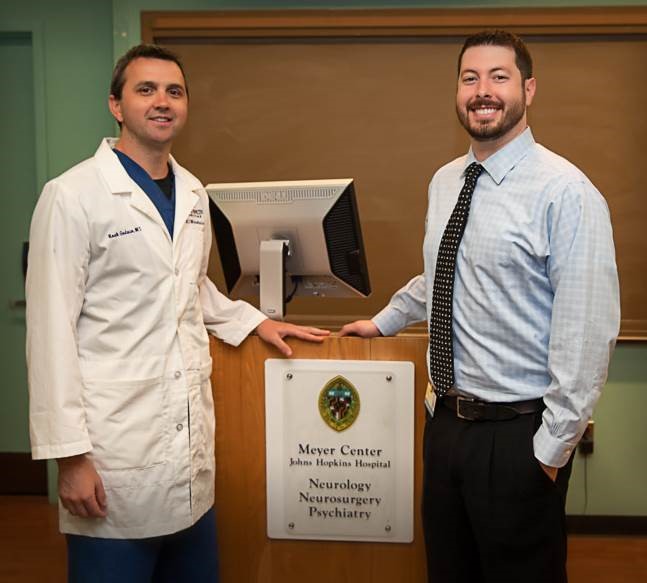 Pain fellows give lectures at the multidisciplinary Blaustein Pain Conference.
Pain fellows give lectures at the multidisciplinary Blaustein Pain Conference.
Supervision and Clinical Independence:
Fellow typically pair with one attending during clinic days, during which consultation and procedural (interventional) elements of patient care under the direct supervision of the pain faculty member. A graduated progression of leadership and clinical decision making occurs during subspecialty training. The program anticipates that fellows grow into more independent clinical decision makers with respect to both the pharmacotherapeutic and interventional management of pain patients as training progresses.
We encourage fellows to participate in ongoing clinical investigations and laboratory research relevant to their interests and careers. Fellows have access to the wealth of resources within the Division of Pain Medicine and Pain Research, Department of Anesthesiology & Critical Care Medicine, and Johns Hopkins Hospital, as well as other Hopkins entities such as the Bloomberg School of Public Health.
The Department of Anesthesiology and Critical Care Medicine (ACCM) also sponsors a National Research Service Award (T-32) for Postdoctoral Research Training in Anesthesiology by the National Institutes of Health (NIH). Pain fellowship applicants interested in academic research careers may submit a separate, one page addendum to the personal statement regarding their motivation and interest in research.
Our Fellows have ample opportunity to publish as first-authors on manuscripts.
Division Faculty and Clinical Associates
Peju Adekoya, MD, Assistant Professor
Oluwanifesimi Akinwamide, MD, Assistant Professor
Paul J. Christo, MD, MBA, Associate Professor
Interim Chief, Division of Pain Medicine
Tina Doshi, MD, MHS, Assistant Professor
Vahid Grami, MD, MPH, Assistant Professor
Director, Pain Medicine Fellowship Program
Annie Hsu, MD, Assistant Professor
Director for Quality Assurance
Steven Levin, MD, Assistant Professor
Adeola Sadik, MD, Assistant Professor
Eellan Sivanesan, MD, FASA, Assistant Professor
Director of Neuromodulation
Eric Wang, MD, Assistant Professor
Kayode A. Williams, MD, MBA, FFARCSI, Associate Professor
Advanced Practice Providers
George Marie Garber, CRNP
Pain Fellows 2024-2025
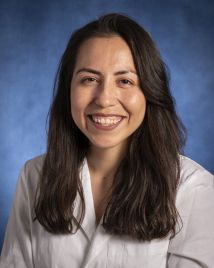
Stephanie Crimmel, MD
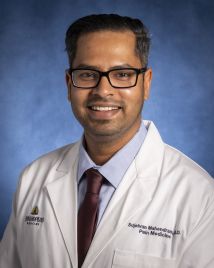
Sujeivan Mahendram, MD

Krithika Mahesh, MD, DO
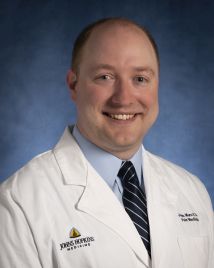
John Manor, MD, DO

Preston Ooi, MD, DO

Trevor Van de Water, MD